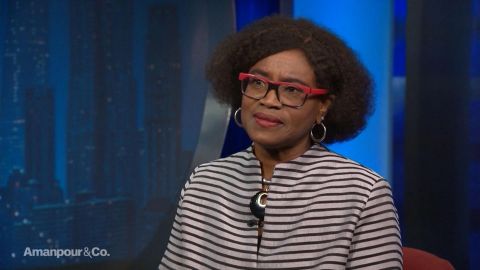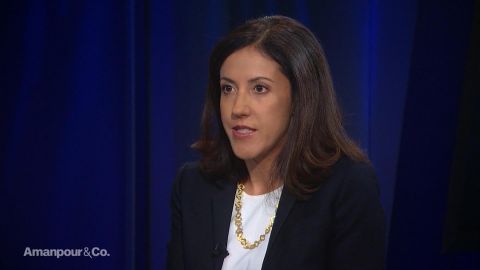Read Transcript EXPAND
CHRISTIANE AMANPOUR: Women were promised to the men. Flesh that out. I mean —
AZADEH MOAVENI, AUTHOR, “GUEST HOUSE FOR YOUNG WIDOWS: AMONG THE WOMEN OF ISIS”: The idea was that everyone would be building an Islamic community, that this would be a homeland where Muslims could live piously. They would not have to face the racism and discrimination of Europe. They would not have to live under the corrupt dictators of the Arab world. And so the idea was for families even to come. We had all families go, three generations from the U.K. One family was grandparents, you know, children, children of the children. So the idea was to go and build a society, so whether that would be a place where people can be matched together or to come altogether as a family unit.
AMANPOUR: So you follow about 13 girls, right, and you have very close access to them. I mean, how did you get this access? Where did you find them? I mean, I guess they are all widows and probably you found them all in the camps there. But, how was the reporting conducted?
MOAVENI: I started quite early. So I started working on this in early 2015, around when those three schoolgirls from East London went.
AMANPOUR: Professional green girls.
MOAVENI: Professional green girls.
AMANPOUR: We have pictures of them. Yes.
MOAVENI: So I was riveted by that. I was struck by how they were excommunicated in the presses, so they were no longer British anymore. So they weren’t, you know, citizens of the U.K., girl citizens. But at the same time, what had happened to them to me seemed intelligent. I mean, I had been reporting from the Middle East for 20 years, so the challenges that women faced at the corruption, the state repression in those societies, I thought I wanted to tell the story of what had happened to them in an intelligible way. So I started early. I met with girls who had tried to go and had been stopped. Eventually when the caliphate — when the so-called caliphate started to collapse and women fled or were captured, I went to the Raqqa and to the camps in the northeast of Syria and met women there, as well.
AMANPOUR: Did you find, because many, if not most of the girls in your book express regrets of having being lured, having taken part. Do you find their regrets were genuine or are they trying to figure out whatever to say to be able to come back to their countries of origin?
MOAVENI: I think most of the women that I spoke to were genuinely regretful. They — many of them hadn’t participated in crimes themselves, but they knew that they had been part of something that became horrific, that hurt and oppressed so many others. And they were very prepared to come back and be prosecuted and to pay the price for what they did and to have, you know, to them, what seemed like the privilege of returning to a normal life. But most of all, I think they wanted the chance to be prosecuted as citizens of the countries that they came from.
AMANPOUR: So that’s really interesting. But obviously the big case is Shamima Begum. They took away her citizenship, the government here, and she’s still hanging out in Syria in a camp there and they’re refusing to allow her back. Is that what you found that most western governments are not going to allow the women back?
MOAVENI: The reaction of western governments has been really uneven. The U.S. is really in favor of women being brought back.
About This Episode EXPAND
Mark McKinnon and David Axelrod unpack the September 12 Democratic debate with Christiane Amanpour. Reverend Irene Monroe sits down with Michel Martin to discuss how to open up some religious communities to LGBTQ issues. Azadeh Moaveni joins the program to discuss the lives of the wives, widows and children of ISIS militants living in refugee camps in Syria.
LEARN MORE


